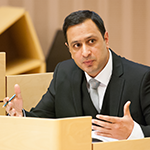Pedagogy of Islamic law in a Diverse Student Cohort: The Challenges and Approaches to Teaching and Learning

Dr. Ahmad Ghouri
Senior Lecturer in Commercial Law University of Sussex – UK
Abstract
Teaching Islamic law in a UK university is a unique experience. First, Islamic law is based on religious beliefs whereas UK universities offer teaching in a secular environment. Secondly, law schools are primarily meant to train lawyers and Islamic law in its purest form is not practically applicable in the UK or even in most Muslim majority countries. Thirdly, due to the series of recent events, such as those related to terrorism, Islamic law and Islam more generally has created certain anxieties making the teaching and learning of Islamic law a sensitive exercise.
These sensitivities exist not only in the interrelationship of Islamic law with other legal systems, but also within Islamic law creating different viewpoints over the need to reimagine and redesign teaching in Islamic law.
The opposing views on interpretation of Islamic legal texts and their application in modern cultures and societies can potentially create frictions of thought and argumentation at the classroom level, which makes teaching and learning of Islamic law both interesting and challenging exercise. Most importantly, from the teaching and learning perspectives, the diverse background of students and their varying expectations makes the delivery of Islamic law teaching a complex exercise unknown to any other law subject.
In these contexts, this article addresses the following key questions:
1) What are the implications for approaches to teaching and learning Islamic law in the context of the above identified challenges; and
2) How to systematically re-evaluate teaching of Islamic law to develop and improve future teaching practice?
By placing those challenges in the framework of existing pedagogical literature and reflecting on my own experiences of teaching and learning in Islamic law, this article discusses pedagogical strategies to address the posed challenges.
Key words: Islamic Law; Diversity; Pedagogy; Approaches to Teaching and Learning.
CV / Resume
Dr. Ahmad Ghouri
Senior Lecturer in Commercial Law University of Sussex, UK
Dr Ghouri is an expert in international investment and commercial arbitration. As a practicing lawyer in Pakistan, he has extensive experience in commercial law and dispute resolution and regularly advises private and public organisations and government ministries. He teaches commercial law at the University of Sussex covering a wide range of subjects including international investment law, international commercial arbitration, corporate law and governance, and Islamic commercial law.
Dr Ghouri has published a number of leading works on international arbitration and dispute resolution. He is the author of Interaction and Conflict of Treaties in Investment Arbitration (Kluwer 2015) and the Law and Practice of Foreign Arbitration and Enforcement of Foreign Arbitral Awards in Pakistan (Springer 2013). His research papers cover a range of important legal and policy interests including the China-Pakistan Economic Corridor, foreign investment policy; and the negotiation, conclusion and enforcement of treaties. In addition to his primary research interests, Dr Ghouri is committed to raising public awareness of legal issues relating to Pakistan and the South Asian region.
Dr Ghouri is a member of the Commercial Law Reform, UK; Global Advisory Board of the Centre for International Investment and Commercial Arbitration, Pakistan, a senior researcher at the Turku Institute for Advanced Studies, University of Turku, Finland; and a member of the Sustainable Market Actors for Responsible Trade (SMART), University of Oslo, Norway. He has been a faculty member in International Economic Law and Policy at the Harvard Law School’s Institute for Global Law and Policy.
